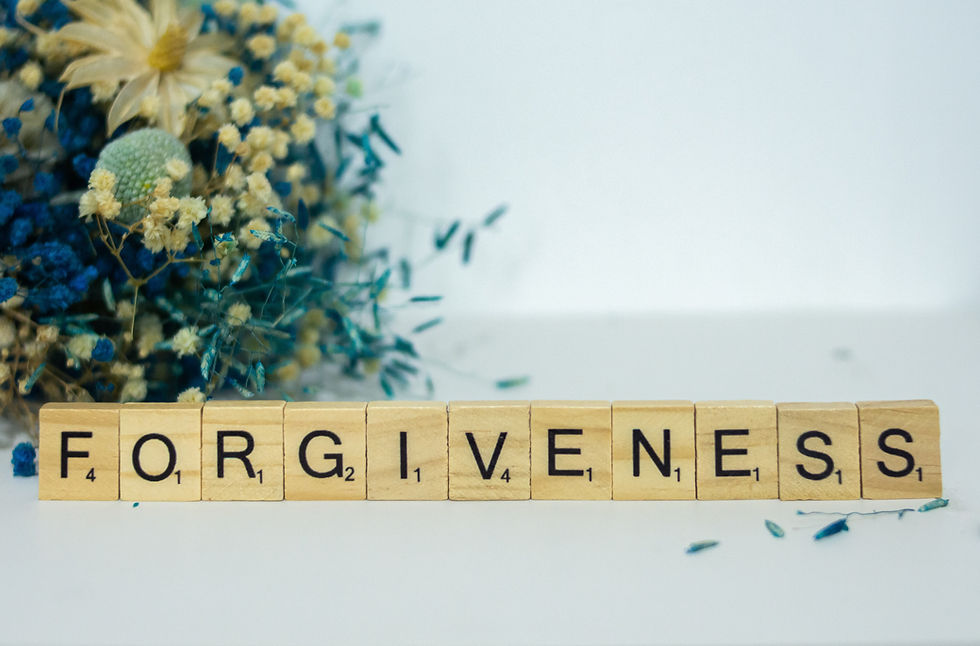Embracing Change: The Power of Forgiveness and Growth
- Nov 14, 2024
- 6 min read
Engaging Reflection on Transformation

Change is a constant in life, and our ability to adapt, forgive, and grow is what helps us navigate this ever-shifting landscape. The phrases "forgive and forget" and "accept people for who they are" carry deep wisdom and although may not seem related, for many of us, go together like Oreos and peanut butter. Whether it’s family, friends, or colleagues, recognizing that people can change and evolve is vital for our personal development.
In this post, we’ll delve into the life-altering power of forgiveness, the importance of acceptance, and the value of taking action to mend broken relationships.
Letting go of past hurts can lead to not just our growth but also that of others around us.The Essence of Forgiveness
Forgiveness is often thought of as a gift for others, but it is primarily a gift to ourselves. Holding onto anger and resentment doesn’t just weigh us down; it can also hinder our happiness and ability to move forward.
Tyler Perry once said "Forgiveness is so incredibly powerful. Forgiveness is not for the other person; it is for you. There are people living their lives who've done you wrong... they are happy, walking down the street not even thinking about you. But there you are, holding onto un-forgiveness. ... my entire fuel was based on the negativity of not forgiving.... but once I forgave him, I had to find another source of fuel. So, the negativity and all the darkness that I've been through was the source, now I needed a more positive source."
The Challenge of Forgiveness
It's true that forgiveness is not simple. It requires time and effort, especially when the hurt runs deep. It’s vital to understand that forgiving doesn’t mean excusing the behavior that caused the hurt; it means acknowledging the pain, understanding it, and making a conscious choice to move on.
Steps to Forgiveness
Acknowledge Your Feelings: Recognize and accept your emotions. Feeling hurt, angry, or sad is perfectly natural. Similarly to grief, forgiveness has its stages, and you must acknowledge that someone has hurt you and resist denial. The pain they caused is SO real, the friendship/relationship is in danger or has been lost, and that loss in your life warrants any grieving that may come. Forgiveness is not the same as reconciliation – only one party has to forgive while it takes two to reconcile. Forgiveness is not forgetting the wrong, trying to deny or suppress it, nor is it condoning or excusing the behavior and actions. Forgiveness is just you realizing that holding on to the past serves no good purpose in the present. Forgiveness is you taking charge of your life to the extent that it is possible and freeing yourself from the chains of past wounding.
Put Things into Perspective: Understand that everyone is broken and has past hurts, our parents are flawed, our siblings are flawed, everyone is flawed. Everyone you know has been hurt at some point in their life and has their own demons to deal with. We are all walking wounded. Try to view the situation from the other person's point of view. For instance, understanding someone’s difficult background may help foster empathy and forgiveness. Accepting that the person who hurt you, has brokenness, will help you in letting go of the hurt they caused. This is not the same as condoning what they have done – it simply allows you to move forward with your life through letting go
Decide to Forgive: Make an intentional decision to release the anger and resentment. You have to accept that forgiveness is a process. While making a committed, conscious decision to let go of the hurt and pain, you must also acknowledge that forgiveness is being done for YOU and your well-being. Feelings of anger and resentment also reinforces the feelings of victimization. Protect yourself and commit to never letting it happen again, but do not hold on to the harmful, unhealthy emotions of anger, bitterness, and resentment.
Forgiveness is a gift you give yourself, allowing wounds to heal, making you stronger and healthier both mentally and physically.
Communicate: If you can, express your feelings to the person who hurt you. A sincere conversation can be a crucial part of the healing process. If you are able to have an open conversation, remember that tensions are high and nothing good ever comes from unnecessary meanness. For many of us, the option for an open conversation is null and void, and to you, I encourage you to still have the conversation. To write an open letter, to share a glass of your favorite wine and put pen to paper and write it all out. Work through the emotions, the uproar, allow yourself to cry and to feel, and best of all, allow yourself to forgive yourself too! You too, have to forgive yourself for holding on for so long, preventing your own healing.
Move Forward: Direct your focus toward future possibilities instead of dwelling on past grievances. Forgiveness is all about changing your own heart. It takes courage and strength to put the past in its place.
Acceptance and forgiveness are essential if you want to create a happy and fulfilling life. While acceptance is forgiving every moment that doesn’t go out way, forgiving someone is accepting what has happened. It doesn’t mean we are condoning what was done, but rather consciously choosing to let go of any feelings of resentment, anger, and blame, and ultimately moving on.
Accepting People for Who They Are
Acceptance plays a vital role in building healthy relationships. Every individual has quirks and flaws. Rather than seeing these as hurdles, embracing them can deepen connections.
The Importance of Acceptance
Recognizing that no one is perfect allows people the space to grow without the fear of judgment. This atmosphere of acceptance can foster honesty and openness, making room for meaningful relationships.
The Benefits of Acceptance
Stronger Relationships: When we accept others, it cultivates trust and leads to more profound, meaningful interactions. A study found that higher levels of acceptance often predict greater relationship satisfaction, with 64% of couples reporting improved communication.
Increased Empathy: By understanding the diverse backgrounds and experiences of others, we nurture compassion.
Personal Growth: Accepting others compels us to reflect on our behaviors and attitudes, often prompting us to improve ourselves as well.
Embracing Opportunities to Make Things Right
Life offers numerous chances to right past wrongs. Actively taking these opportunities for reconciliation can pave the way for healing.
Recognizing Opportunities
It is essential to recognize when chances to reconcile arise. These moments may come in various forms—through a genuine conversation, an apology, or a willingness to change behavior.
Taking Action
Reach Out: If it feels right, contact the person to discuss your feelings.
Be Honest: Openly share your feelings and express a desire to make amends.
Listen Actively: Allow the other person to share their perspective without interrupting.
Follow Through: If you commit to change, be sure to act on those promises.
The Power of Growth and Change
One of life’s beautiful aspects is our ability to grow. As we encounter challenges, we can evolve emotionally, mentally, and spiritually. We must all remember that for everyone we encounter, this is our very first time on Earth, this is our first time doing life, and we all deserve an opportunity to grow and change! Furthermore, we must understand that people can and oftentimes look forward to, learning from their mistakes! Change often takes time, many individuals strive to become better versions of ourselves, and without knowing, we may not know what growth we may require.
Supporting Others in Their Growth
Encouragement: Support loved ones as they work to improve themselves. A simple "I believe in you" can make a significant difference.
Patience: Understand that personal growth is a gradual process. Be kind and patient as they navigate their journey.
Constructive Feedback: If the situation calls for it, provide thoughtful feedback that can help others on their path to self-improvement.
The Emotional Weight of the Past
Letting go of past grievances can be freeing. Clinging to old hurts can overshadow our ability to appreciate present experiences. Past mistakes, both ours and others', can burden us emotionally. The longer we hold onto these grievances, the more we risk losing sight of joy and connection in the present.
Strategies for Letting Go
Practice Mindfulness: Mindfulness techniques, like deep breathing and meditation, can anchor you in the present moment.
Reflect on Lessons Learned: Instead of focusing solely on the pain, think about the lessons learned from past experiences.
Create New Memories: Engage in joyful activities that foster new, positive experiences and memories.
Seek Support: Reach out to friends, family, or professionals if you find it hard to let go.
Final Thoughts on Forgiveness and Growth
The journey toward forgiveness, acceptance, and growth can be challenging, yet it is deeply rewarding. Embracing change helps us form healthier relationships and promotes a fulfilling life. By acknowledging the potential for change in others and recognizing the opportunities for reconciliation, we learn to release the grip of the past.
As we continue navigating life's complexities, let us harness the power of forgiveness and embrace acceptance. This mindset not only enhances our lives but also fosters a more understanding and compassionate world.
By supporting growth for ourselves and others, we can truly welcome change and turn struggles into stepping stones toward a brighter future.
Keep growing and embrace forgiveness.
XO, Kelleen





Comments